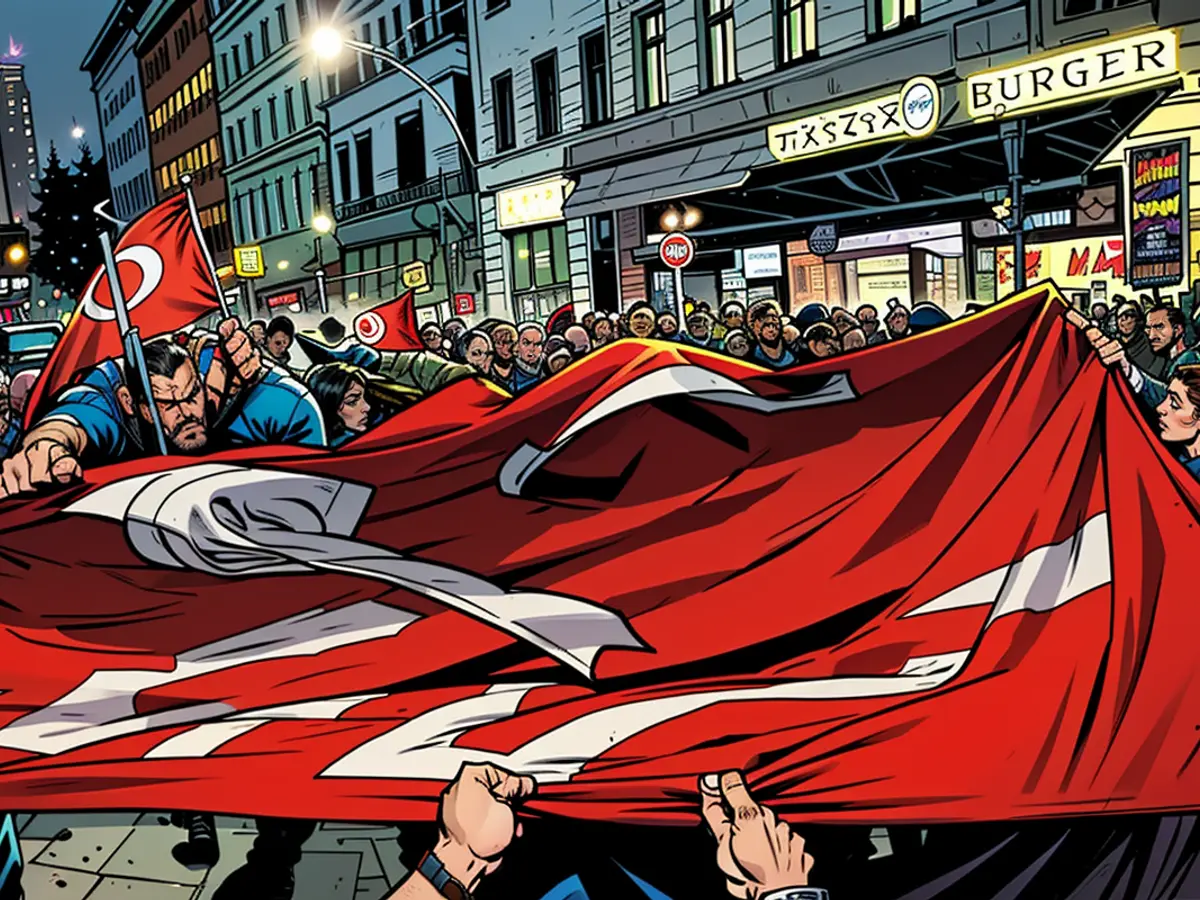You can't do it without beer and a firm footing
In Britain, the Tories lost for the reason that the clueless Premier Rishi Sunak comes across as "out of touch." It's an overlooked problem in politics.
On Tuesday evening, unrest breaks out late in the evening among the refined Parliamentary Society across from the Reichstag Building. People in suits and gowns are worried, as they want to go home - but Turkey wins this night against Austria, and it's clear what that means in Berlin: The streets are in chaos.
As I turned onto Dorotheenstraße, a street gully between Bundestag properties, there was no hell, the mood was rather heavenly: Overwhelmingly young people were waving Turkish flags, cheering, hugging each other, and somewhere a little fireworks smoke was blowing and illuminated Turkish flags, reflecting off the traffic lights. Nothing about it was unpleasant, at least there were no wolf's greetings to be seen. It's nice when you can gather around something like that.
Germans cannot do the same thing to the same extent - and if they do, they are under suspicion. German flags, after numerous right-wing shifts in the EU and elsewhere, are once again a political issue. The Federal Agency for Political Education is currently making headlines with a small video in which they test the thesis that the flag joy of the 2006 World Cup was responsible for the rise of Pegida and right-wing populism. That sounds like political science fairy tale at first, but apparently there are scientists who see it that way.
The Krampf went wild, like with Merkel
The Krampf went wild at the beginning of the ongoing EM: After long debates, the Federal Police are allowed to display the flag, but the Berlin Police are not (neutrality duty of officials!). Many recall Angela Merkel, who in 2013, after winning the Bundestag election, took a colleague's microphone away - it was too much Germany, also "on days like these."
Many turn a blind eye to these debates. And when too many eye pairs turn away, one should be vigilant. In parallel with the return of nationalism, the political elite is having a particularly hard time these days holding contact with the broad population and finding a common denominator. The Powerful are notably aloof - just "out of touch," as the English say.
The British Prime Minister Rishi Sunak conducted his election campaign by shepherding sheep and drinking something from a pint that looked suspiciously like water in a pub. That's apparently a form of treason for the Britons. According to some commentators, the Tories' candidate could have made do with apple cider or something similar. It would have at least looked like Sunak was "one of us." But Sunak apparently didn't manage that - or maybe he enjoyed being a teetotaler, a strict abstainer.
Race for greatest popular distance
A race for the greatest popular distance is going on. The political elite, in particular, is having a hard time these days maintaining contact with the broad population and finding a common denominator. The powerful are notably detached - just "out of touch," as the English say.
The British Prime Minister Rishi Sunak campaigned by shepherding sheep and drinking something from a pint that looked suspiciously like water in a pub. That's apparently a form of treason for the Britons. According to some commentators, the Tories' candidate could have made do with apple cider or something similar. It would have at least looked like Sunak was "one of us." But Sunak apparently didn't manage that - or maybe he enjoyed being a teetotaler, a strict abstainer.
In France, Emmanuel Macron of the similarly clumsy kind (reminding us of the watch debacle), has once again gotten himself into such a mess that many French people now see the far-right Rassemblement National as the last unexplored possibility - as if politics is a box of rubber bands. In America, Kamala Harris, the hapless and weak vice president, cannot replace the aging Joe Biden, as she is unpopular. She also comes across as aloof: Her opponents have been amused for months about her obsession with Venn diagrams. This passion is understandable to a certain extent - but it's not exactly endearing.
And in Germany? Olaf Scholz and Friedrich Merz are engaged in a tough race for the greatest populist appeal. The Chancellor achieves this through uncomprehending communication ineptitude, and the opposition leader still suffers from the image of aloofness, new glasses on, a sensitive podcast at "Hotel Matze". No one is calling for "a bottle of beer, otherwise I'll strike here", like a certain Gerhard Schroeder used to.
There are politicians in almost every party who can connect with the people. But it's a tragedy of the democratic party system that these talents are often not the leading candidates. If folksiness and flag-waving are not available, then the most essential thing should not be missing: the feeling of security is the absolute minimum of self-assertion and identity that a government must offer its citizens. Less than that, and nationalism follows.
Socialization Romanticism and Criminal Empathy
The governments' out-of-touch presentation in matters of security was particularly evident in the face of the violent acts of the past few weeks. In response to the murder of the 20-year-old Philippos Tsanis in Bad Oeynhausen, both Green and SPD representatives seem to be invoking social romanticism and criminal empathy. Federal Interior Minister Nancy Faeser even lets it come across that Philippos' death is a logical consequence of failed German integration efforts and not the work of a (known) criminal.
The government parties shy away from punishment demands from the Union or even the AfD for principled reasons. Criminologically, they might be right: Does the Criminal Code even deter a knife-wielder or a club-wielder? Red and Green promote detached, passive-inducing arguments that a frightened population cannot be reached with. Objectivity alone does not win elections: Water is indeed healthier than beer, but water has failed to save the Tories.
The Saxon Minister-President Armin Schuster (CDU) recently made a point in a Bundestag speech: "The people expect security and protection from me, and they tell me that to my face." Schuster has recognized that reality is what is communicable, and that people are not swayed by statistics. The feeling of security has "dramatically decreased". "Through such discussions!" interjected the Green politician Lamya Kaddor - as if the debate had no merit.
Understood is the dramatic political situation in Germany, in July 2024, none of the government parties, but least of all the Greens. When FDP interior politician Konstantin Kuhle warned of control loss in migration at the podium in the communes, even SPD and even Union deputies clapped - only among the Greens no hand moves: nothing to see, nothing to hear, nothing to say. Only inappropriately laughing, that's all.
Detachment is on many faces, whether at the pub with a glass of water or in the Bundestag during a debate about knives, murder, and group rape. It's nice when a global and plural thinking, partly teetotal elite steers the course and not the regulars' table. But this elite must at least be able to simulate beer drinking and flag waving if they don't want to slide into insignificance.
Politically, this can mean that one has to negotiate with the Taliban, even if one gets dirty in the process. It can mean harsher penalties, even if no one knows how much that brings. The intellectual left shuns the charge of populism and superficiality like Rishi Sunak shuns apple juice. But "out of touch" quickly follows "out of office."
Despite the debates about flag-waving and nationalism in Germany, Friedrich Merz and Olaf Scholz are still engaged in a race for the greatest populist appeal. Merz struggles with the image of aloofness, while Scholz is criticized for uncomprehending communication ineptitude. In contrast, Rishi Sunak, the British Prime Minister, faced backlash for his teetotaler image during his election campaign, with some commentators suggesting he should have consumed a more relatable beverage to connect with the British public. Similarly, Emmanuel Macron in France and Kamala Harris in the United States have also been criticized for being viewed as aloof by their respective populations.









